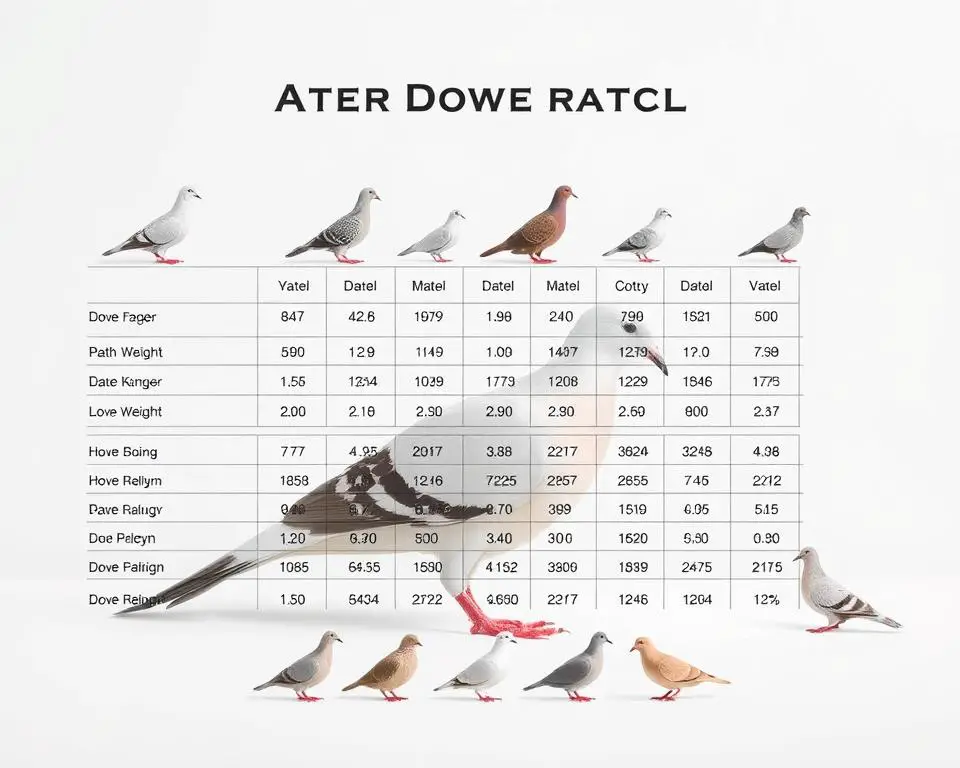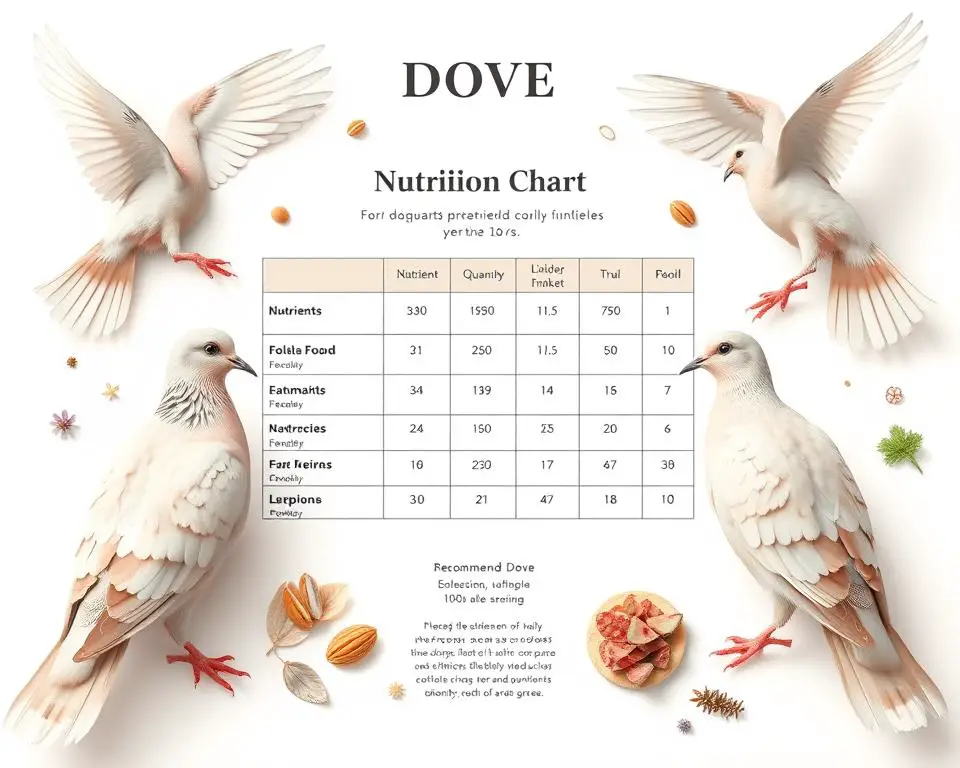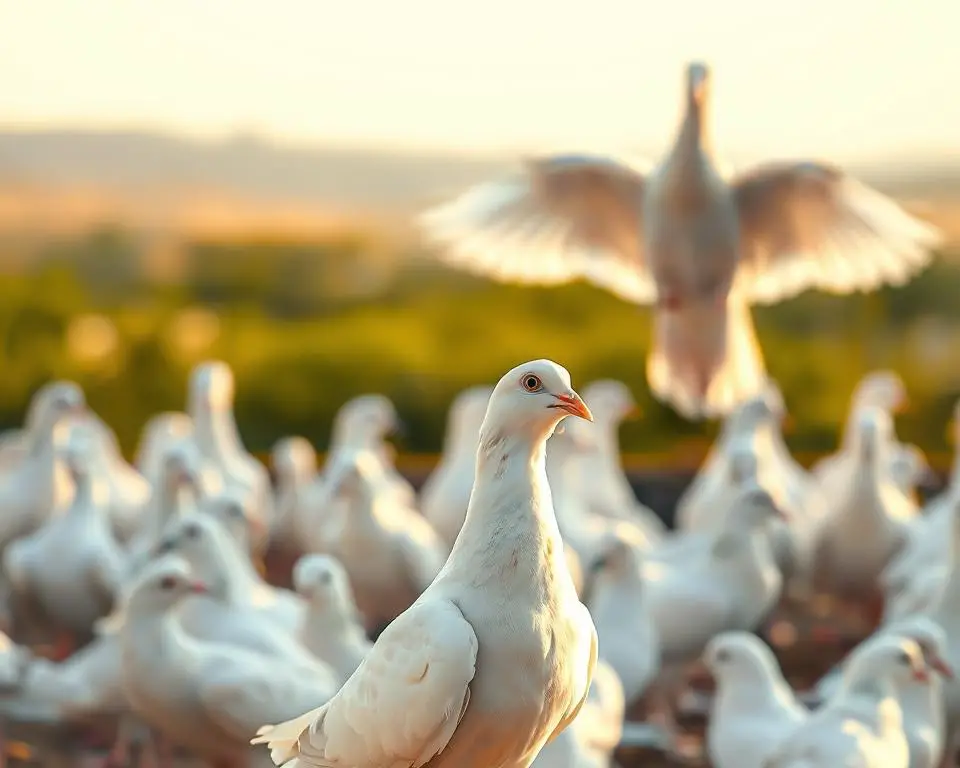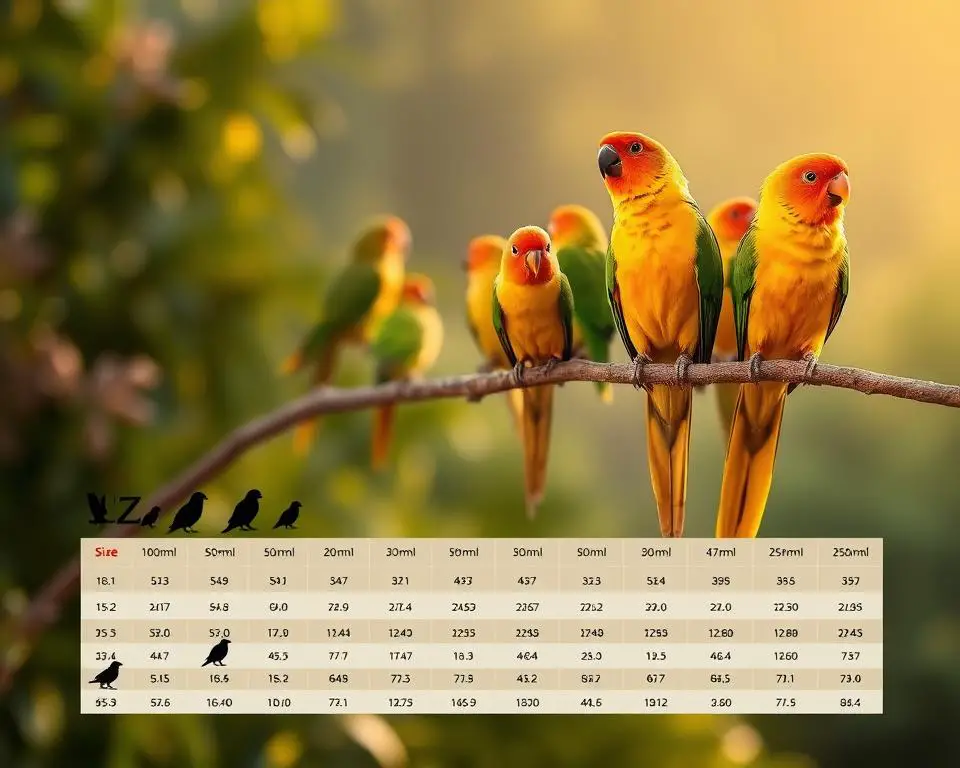Understanding the healthy weight range for birds is key. This is especially true for dove owners and vets. They need accurate data to keep these birds healthy. A dove weight chart is a vital tool in bird care, showing the importance of a bird’s body condition.
Knowing the healthy weight range for different dove species is important. Our chart uses data from experts like Carpenter JW and Sibley DA. It shows the average weights for common pigeons and doves. This chart helps both new dove owners and experienced vets keep these birds healthy.
Our chart offers insights from “Exotic Animal Formulary” and “Clinical Avian Medicine and Surgery”. It shows average weights and the health needs of doves. This resource shows the love and dedication of bird owners and professionals in caring for doves.
Understanding Dove Species and Their Weight Differences
Exploring the diversity among dove species is key for bird lovers and caretakers. The size and weight differences between species show their health and nutrition needs. This is vital for their care.
Distinguishing Between Common Dove Types
Many varieties exist, but some common ones are the Mourning Dove, the Rock Dove, and the White-winged Dove. Each has unique physical traits and behaviors. They are interesting to study and watch.
Average Weights Across Species
The average weight of a dove varies by species. Here’s a table showing typical weights for common doves. It highlights the weight differences important for avian health checks.
| Species | Average Weight |
|---|---|
| Mourning Dove | 112 grams |
| Rock Dove | 238 grams |
| White-winged Dove | 150 grams |
The Impact of Age and Health on Weight
Age and avian health greatly affect a dove’s weight. Younger doves weigh less because their bodies are still growing. Adult doves’ weights vary based on health, diet, and activity. Watching them closely helps spot health issues and keeps them at a healthy weight.
Importance of Monitoring Dove Weight for Health
![]()
Watching the weight of doves is more than just tracking numbers. It’s key to their avian wellness. Changes in weight can signal health problems or changes in their environment. For those who love birds or keep them as pets, bird health monitoring is essential.
Regular checks help spot health issues early. This way, small problems can be fixed before they get worse. It makes the doves’ lives better and strengthens the bond between birds and their caretakers.
By tracking dove weight, owners can see if their feeding is working. They can then adjust the diet to keep the birds healthy. This focus on nutrition helps avoid health problems and keeps the birds well.
Chart for Doves Average Weight

The dove average weight chart is key for anyone caring for doves. It’s made with data from top avian vets. This chart helps check a dove’s health and keep it at the right weight.
This chart is vital for both dove owners and vets. It gives accurate weight data for different dove breeds. This is crucial for making health decisions for your dove.
| Breed | Average Weight |
|---|---|
| Mourning Dove | 120g |
| Rock Dove | 160g |
| Eurasian Collared Dove | 200g |
| Ringneck Dove | 150g |
Using a detailed dove average weight chart helps a lot. It keeps your doves healthy by avoiding under or overweight issues. It helps in making the right food plans and care for each dove’s needs.
The Role of Diet in Maintaining Healthy Dove Weight

Keeping doves at a healthy weight is key for their well-being. A good diet plan includes dove nutrition and bird supplements. Knowing their dietary needs helps in managing their weight effectively.
Optimal Nutrition for Doves
An avian diet for doves should have grains, seeds, and greens. These foods give them the nutrients they need. Bird feed made for doves can improve their diet by balancing carbs, proteins, and fats.
Supplements and Their Impact on Weight
- Vitamin and mineral supplements can address any deficiencies in a dove’s diet.
- Certain bird supplements, such as calcium and vitamin D3, are crucial for bone density and overall health.
- Omega fatty acids help maintain a healthy metabolic rate, which is instrumental in effective dove weight management.
Using supplements correctly helps doves stay at a healthy weight. This prevents obesity or malnutrition, which can cause serious health issues.
Designing a Weight Monitoring Program for Doves

Creating an effective weight monitoring program for doves is key in avian weight management. It helps keep the birds at a healthy weight at all life stages. This prevents health problems from being too heavy or too light.
Using regular dove weigh-in practices is a good idea. It tracks the birds’ growth and health. It also checks if diet and environment changes are working well for them.
Regular Weigh-ins: Methods and Frequency
For successful weigh-ins, use a light, easy-to-carry scale that doesn’t stress the birds too much. Digital scales are best because they’re accurate and easy to use. Weigh doves at the same time every day in a quiet place for consistent results.
- Weekly weigh-ins are a good routine.
- More often might be needed if a dove is getting treatment or diet changes.
- Keep a record of each weigh-in to see trends over time.
Interpreting Weight Changes
It’s important to understand weight changes in avian weight management. A small weight change might not be a big deal. But big or consistent changes could mean health problems or diet issues. These signs help make changes to the dove’s diet or get vet advice if needed.
For instance, steady weight gain might mean the diet is too rich or the dove isn’t getting enough exercise. Sudden weight loss could be a sign of illness or stress. Spotting these patterns helps make better choices for the dove’s health.
By following these steps, dove owners and breeders can greatly improve their birds’ lives. They can ensure their doves are healthy, happy, and doing well with the right care.
Common Causes of Weight Fluctuation in Doves
Doves, like other birds, can have big weight changes. These changes might mean they’re just going through a natural phase or could be a sign of health problems. It’s important to figure out why these weight changes happen to keep them healthy.
What a dove eats can greatly affect its weight. A big change in diet can cause noticeable weight shifts. Stress, whether from the environment or their feelings, also affects a dove’s weight. Changes in their home or losing a mate can lead to weight loss or gain.
Illnesses or parasites can also cause doves to lose weight. When a dove is sick, it might eat less or burn more energy, leading to weight loss. On the other hand, some health issues can make a bird hold onto water or grow in ways that look like weight gain.
“Understanding the underlying causes of weight changes in doves is vital for early intervention and effective management of their care.”
The breeding season can also cause weight changes in doves. Female doves might gain weight as they get ready to lay eggs. Males might lose or gain weight due to their increased activity during this time.
Teaching dove owners about these causes helps create a better environment for their pets. By watching for signs of weight gain or loss and acting quickly, owners can keep their doves healthy and happy.
Environmental Factors Affecting Dove Weight

The dove habitat, environmental impact on avian weight, and seasonal weight changes in birds are key to their health. Different environments change doves’ behavior and body health a lot.
Let’s look at how the habitat affects dove health. We’ll also see how weight changes with the seasons.
The Influence of Habitat on Dove Health
Dove habitats range from woodlands to cities. They affect doves’ food and shelter. In good habitats, doves are healthy and strong. But bad or polluted places can harm them.
Seasonal Changes and Weight Variation
Seasonal weight changes are natural for birds. In cold months, doves gain weight to stay warm. In hot seasons, they lose weight to avoid overheating.
| Season | Average Weight Increase | Average Weight Decrease |
|---|---|---|
| Winter | 10% | – |
| Summer | – | 8% |
This knowledge helps dove caregivers and fans. It shows the importance of adjusting care with the seasons. This way, we can better care for doves all year round.
Avoiding Obesity in Doves: Tips and Strategies
Keeping doves healthy is key to their long life. Managing their weight involves diet, exercise, and health checks. Here are ways to help your dove stay fit.
- Customize the Diet: Work with a vet to make sure your dove eats right. Use a mix of seeds, grains, and greens. Avoid too much fat.
- Regular Exercise: Help your dove stay active. Give them a big cage to fly in or a safe area to fly freely for hours.
- Monitor Weight Regularly: Weigh your dove every month. This helps spot any weight changes that might mean health problems.
- Watch for Health Signs: Look out for signs of trouble like being tired or eating less. These can mean weight issues.
Following these tips can help prevent obesity in doves. It ensures they live a healthier life as your pet.
Rehabilitating Underweight Doves: A Guide
To help underweight doves, first spot the early signs of undernutrition. Then, start a strong plan to help them get healthy again.
Identifying Underweight Doves
Looking for underweight doves takes careful eyes. Look for visible bones, being very tired, and poor feathers. Weighing them often is key to knowing their health.
Finding them early means you can act fast. This greatly helps their chances of getting better.
Nutritional Recovery Plans
Helping doves get healthy needs a good plan. This plan should match the dove’s needs. It should have the right mix of proteins, fats, carbs, vitamins, and minerals.
| Nutrient | Benefit | Recommended Source |
|---|---|---|
| Protein | Builds muscle and repairs tissue | Legumes, seeds, and specialized dove food |
| Fats | Provides energy and supports cell growth | Avocado, nuts, and fortified seeds |
| Carbohydrates | Fuels daily activity and maintains body weight | Grains, fruits, and vegetables |
| Vitamins and Minerals | Essential for immune system and overall health | Supplements and vitamin-enriched dove foods |
Every part of the plan is important. It helps doves not just gain weight but stay healthy long-term. With careful feeding, underweight doves can get strong and healthy again.
Case Studies: Success Stories in Dove Weight Management
In the field of dove weight management, case studies show how to care for birds well. They share stories of how careful planning helped doves stay healthy. These stories are great for anyone who loves birds or takes care of them.
A rehabilitation center helped an overweight dove by changing its diet. They gave it foods high in fiber and less fat. Soon, the dove was at a healthy weight. This shows how important it is to tailor a bird’s diet.
Another study found that doves with more to do stayed healthier. They had places to fly and different heights to perch. This study shows that keeping birds active helps them stay at a good weight.
Also, regular health checks are key. One dove was caught early when it started to gain weight. Changing its diet right away helped avoid serious health problems. This shows how important it is to watch a bird’s weight closely.
These stories show how careful care can make doves thrive. Each case study gives us a plan for keeping birds healthy and happy.
Advanced Tips for Dove Weight Maintenance
Keeping doves at the right weight is key for their health and breeding success. This section offers tips on advanced dove care. It shows how to manage weight control in breeding doves and add avian exercise to their daily routine.
Breeding Considerations and Weight
The weight of doves is crucial for breeding success. Being too heavy or too light can affect fertility and health. This can harm the chances of healthy offspring.
So, it’s important to balance their diet. They need vitamins and minerals but should not be overfed. Checking their weight before and during breeding helps them stay healthy for reproduction.
The Role of Exercise in Weight Control
Exercise is vital for doves to stay healthy. They need space to fly and be active. This prevents obesity and keeps them mentally well.
Using flight cages or aviaries helps them stay active. Tailored exercises also support muscle and heart health. This helps manage their weight.
By following these advanced care practices, doves can thrive. They stay healthy and balanced, just like in their natural habitats. The right diet and exercise lead to strong health and a long life for breeding doves.
Conclusion
As we wrap up our look at caring for birds, it’s clear that dove weight care is key. We’ve explored the different species and their weight ranges. We’ve seen how important it is to match diet and monitoring to each bird’s needs.
Good nutrition and regular weight checks are essential for a bird’s health. This summary shows the hard work needed to keep our feathered friends happy and healthy at home.
We’ve shared important tips on keeping doves at a healthy weight. Factors like diet, exercise, and habitat all play a role. Spotting and acting on weight changes is crucial for caring for birds.
The health and joy of doves depend on our care and knowledge. By understanding dove weight care, we can help them reach their healthiest state. We hope this article has given you the tools to care for your doves well.





